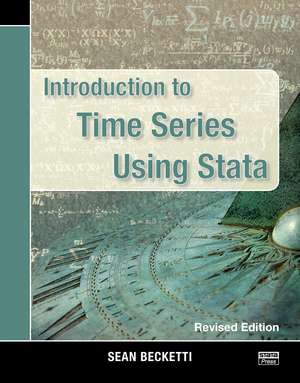Introduction to Time Series Using Stata
Autor Sean Beckettien Limba Engleză Paperback – 2 mar 2020
Preț: 443.01 lei
Preț vechi: 481.53 lei
-8% Nou
Puncte Express: 665
Preț estimativ în valută:
84.77€ • 88.98$ • 70.36£
84.77€ • 88.98$ • 70.36£
Carte disponibilă
Livrare economică 20 martie-03 aprilie
Livrare express 06-12 martie pentru 45.29 lei
Preluare comenzi: 021 569.72.76
Specificații
ISBN-13: 9781597183062
ISBN-10: 1597183067
Pagini: 446
Ilustrații: 111 Illustrations, black and white
Dimensiuni: 189 x 246 x 30 mm
Greutate: 0.86 kg
Ediția:2 New edition
Editura: Stata Press
Colecția Stata Press
ISBN-10: 1597183067
Pagini: 446
Ilustrații: 111 Illustrations, black and white
Dimensiuni: 189 x 246 x 30 mm
Greutate: 0.86 kg
Ediția:2 New edition
Editura: Stata Press
Colecția Stata Press
Public țintă
Academic, Postgraduate, and Professional Practice & DevelopmentCuprins
Just enough Stata
Getting started
All about data
Looking at data
Statistics
Odds and ends
Making a date
Typing dates and date variables
Looking ahead
Just enough statistics
Random variables and their moments
Hypothesis tests
Linear regression
Multiple-equation models
Time series
Filtering time-series data
Preparing to analyze a time series
The four components of a time series
Some simple filters
Additional filters
Points to remember
A first pass at forecasting
Forecast fundamentals
Filters that forecast
Points to remember
Looking ahead
Autocorrelated disturbances
Autocorrelation
Regression models with autocorrelated disturbances
Testing for autocorrelation
Estimation with first-order autocorrelated data
Estimating the mortgage rate equation
Points to remember
Univariate time-series models
The general linear process
Lag polynomials: Notation or prestidigitations?
The ARMA model
Stationarity and invertibility
What can ARMA models do?
Points to remember
Looking ahead
Modeling a real-world time series
Getting ready to model a time series
The Box-Jenkins approach
Specifying an ARMA model
Estimation
Looking for trouble: Model diagnostic checking
Forecasting with ARIMA models
Comparing forecasts
Points to remember
What have we learned so far?
Looking ahead
Time-varying volatility
Examples of time-varying volatility
ARCH: A model of time-varying volatility
Extensions to the ARCH model
Points to remember
Model of multiple time series
Vector autoregressions
A VAR of the U.S. macroeconomy
Who’s on first?
SVARs
Points to remember
Looking ahead
Models of nonstationary times series
Trend and unit roots
Testing for unit roots
Cointegration: Looking for a long-term relationship
Cointegrating relationships and VECM
From intuition to VECM: An example
Points to remember
Looking ahead
Closing observations
Making sense of it all
What did we miss?
Farewell
References
Getting started
All about data
Looking at data
Statistics
Odds and ends
Making a date
Typing dates and date variables
Looking ahead
Just enough statistics
Random variables and their moments
Hypothesis tests
Linear regression
Multiple-equation models
Time series
Filtering time-series data
Preparing to analyze a time series
The four components of a time series
Some simple filters
Additional filters
Points to remember
A first pass at forecasting
Forecast fundamentals
Filters that forecast
Points to remember
Looking ahead
Autocorrelated disturbances
Autocorrelation
Regression models with autocorrelated disturbances
Testing for autocorrelation
Estimation with first-order autocorrelated data
Estimating the mortgage rate equation
Points to remember
Univariate time-series models
The general linear process
Lag polynomials: Notation or prestidigitations?
The ARMA model
Stationarity and invertibility
What can ARMA models do?
Points to remember
Looking ahead
Modeling a real-world time series
Getting ready to model a time series
The Box-Jenkins approach
Specifying an ARMA model
Estimation
Looking for trouble: Model diagnostic checking
Forecasting with ARIMA models
Comparing forecasts
Points to remember
What have we learned so far?
Looking ahead
Time-varying volatility
Examples of time-varying volatility
ARCH: A model of time-varying volatility
Extensions to the ARCH model
Points to remember
Model of multiple time series
Vector autoregressions
A VAR of the U.S. macroeconomy
Who’s on first?
SVARs
Points to remember
Looking ahead
Models of nonstationary times series
Trend and unit roots
Testing for unit roots
Cointegration: Looking for a long-term relationship
Cointegrating relationships and VECM
From intuition to VECM: An example
Points to remember
Looking ahead
Closing observations
Making sense of it all
What did we miss?
Farewell
References
Notă biografică
Sean Becketti is a financial industry veteran with three decades of experience in academics, government, and private industry. Over the last two decades, Becketti has led proprietary research teams at several leading financial firms, responsible for the models underlying the valuation, hedging, and relative value analysis of some of the largest fixed-income portfolios in the world.
Descriere
Introduction to Time Series Using Stata, Revised Edition provides a step-by-step guide to essential time-series techniques–from the incredibly simple to the quite complex– and, at the same time, demonstrates how these techniques can be applied in the Stata statistical package.
